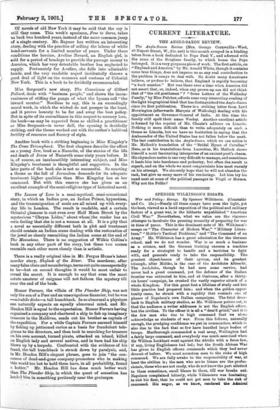CURRENT LITERATURE.
THE ANGLO-SAXON REVIEW.
The Anglo-Saxon Review (Mrs. George Cornwallis - West, 49 Rupert Street, W., 21s. net) is this month arrayed in a binding taken from a book dedicated to Pope Paul V., and adorned with the arms of the Borghese family, to which house the Pope belonged. It is a very gorgeous piece of work. The first article, on " England and America," by Mr. Arnold White, though it contains some true things, does not impress us as any real contribution to the problem it essays to deal with. No doubt many Americans believe, or profess to believe, that England is rapidly becoming "a back number." But was there ever a time when America did not assert that, or, indeed, when any grown-up eon did not think that of "the old gentleman" ? "Some Letters of the Wellesley Family," by Miss Fulcher, affords some very interesting reading of the light biographical kind that has distinguished the Anglo-Saxon since its first publication. There is a striking letter from Lord Mornington (afterwards Marquis of Wellesley) dealing with his appointment as Governor-General of India. At this time the family still spelt their name Wesley. Another excellent article is formed by the reprint of Mr. Choate's address on Lincoln. Nothing is more difficult than to write adequately on such a theme as Lincoln, but we have no hesitation in saying that the Ambassador of the "United States has not fallen below the mark. The last contribution to the Anglo-Saxon which we can notice is Mr. Mallock's translation of the " Bridal Hymn of Catullus." Here, as in his translations from Lucretius, Mr. Mallock shows himself a most fascinating interpreter of an ancient poet's charm. His rhymeless metre is one very difficult to manage, and sometimes it leads him into harshness and pedantry, but often the result is superb, and on the whole we must congratulate him most warmly on his attempt. We sincerely hope that he will not abandon the task, but give tie many more of his renderings. Let him try his hand next at some of the political passages in Virgil or Horace. Why not the Pollio ?


































 Previous page
Previous page